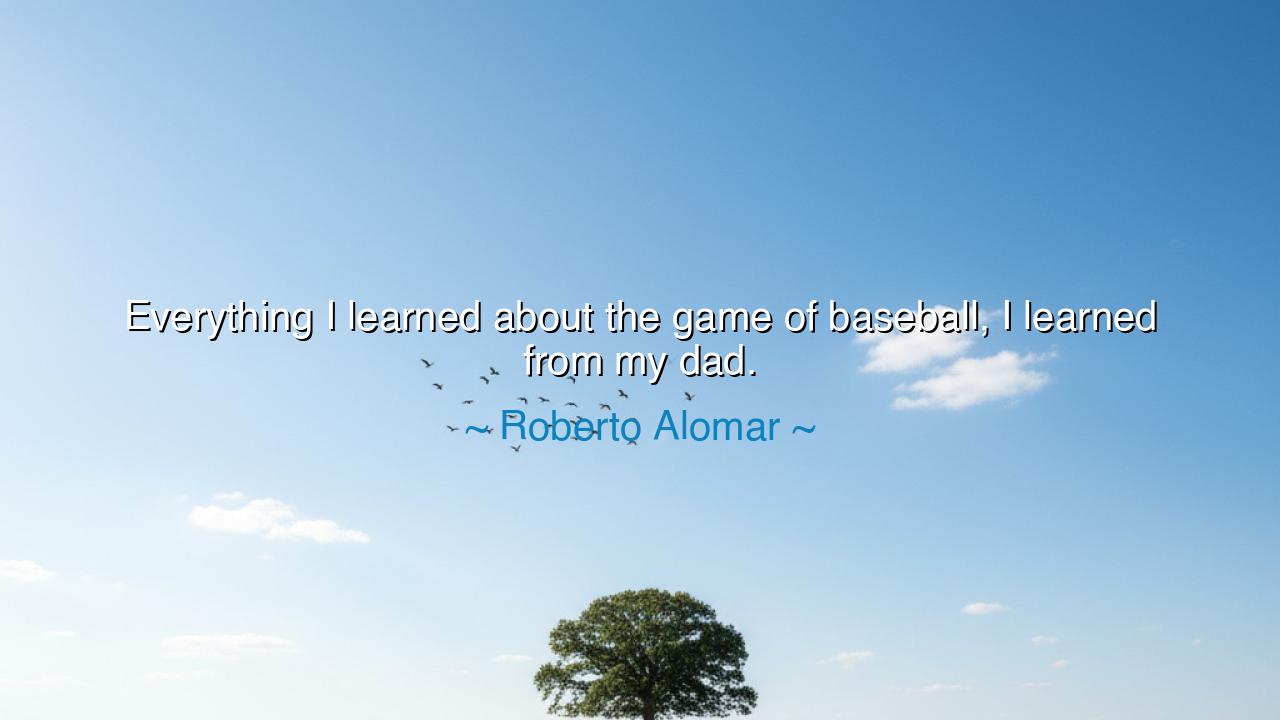
Everything I learned about the game of baseball, I learned from






“Everything I learned about the game of baseball, I learned from my dad.” Thus spoke Roberto Alomar, the master of the diamond, whose grace and instinct made him one of the greatest second basemen in the history of the game. Yet in these simple words, spoken with humility, lies a truth far deeper than the world of sport. For Alomar’s tribute to his father, Sandy Alomar Sr., is not merely about baseball—it is about inheritance, mentorship, and the sacred passing of wisdom from one generation to the next. In his father’s lessons, he found not just skill, but the soul of the game—and through that, the soul of life itself.
When a father teaches his son, something timeless occurs. The moment stretches beyond the field, beyond the ball and bat, and becomes a bond written into the fabric of destiny. The son learns not only the movements of the body, but the discipline of the spirit. The father’s example becomes the first scripture of life—the living guide to patience, perseverance, and humility. In saying he learned everything from his dad, Alomar acknowledges that the game was not taught through drills alone, but through character: how to handle failure, how to honor one’s team, and how to rise again after every error.
To understand the power of such inheritance, we might recall the story of another son and father of mastery: Socrates and his mentor Archelaus, who shaped the mind of the philosopher long before he became the teacher of Plato. Or consider Michelangelo, who as a young apprentice learned the sacred patience of sculpture from his master, Ghirlandaio. In both cases, greatness was born not in isolation but in lineage—in the willing submission of one heart to another’s wisdom. Roberto Alomar’s relationship with his father mirrors this ancient pattern: the apprentice and the master, the pupil and the teacher, joined not by obligation, but by love and reverence.
On the sunlit fields of Puerto Rico, a young Roberto watched his father play—saw the rhythm in his swing, the fire in his eyes, the humility in his stride. He listened not only to words but to silence—the way his father carried both victory and defeat with grace. It was there, in those quiet lessons, that he learned the essence of the game: that baseball, like life, is not about perfection, but persistence. Every inning is a new chance, every mistake a step toward mastery. From his father, Roberto learned that true greatness is not measured by trophies, but by how one honors the craft, the team, and the game itself.
This bond between father and son reflects a universal truth: that wisdom, once given, must be lived to be understood. Alomar’s success—the swift reflexes, the unerring throws, the calm under pressure—were all the flowering of seeds his father planted long before. Yet, as every good teacher knows, the true joy of passing down knowledge lies not in control, but in watching the student surpass the master. When Roberto entered the Hall of Fame, his father’s pride was not of ownership, but of fulfillment—proof that the torch had been carried well.
The meaning of Alomar’s words, then, extends beyond baseball. It is a meditation on gratitude, a reminder that none of us truly stands alone. Every skill we hold, every strength we wield, was shaped by those who came before us—parents, mentors, friends, even rivals. To acknowledge this lineage is not weakness; it is wisdom. It keeps us humble before the chain of learning that stretches back through time, each link forged by sacrifice and love.
The lesson, therefore, is clear: remember your teachers. Honor those who shaped your journey, not only in great ways but in small ones. Whether your “game” is art, work, faith, or family, never forget the hands that first steadied your own. Seek their guidance while they live, and carry their legacy when they are gone. Teach others as you were taught, so that knowledge may continue its eternal cycle.
So, my child, when you hear the words of Roberto Alomar, do not think only of baseball. Think of the sacred circle of learning—the father and son, the mentor and student, the past and the future. Remember that everything you know was once a gift, freely given, and that your task is to pass it forward. For the greatest tribute you can offer to your teachers is not to worship them, but to become a teacher yourself. And thus, through you, their wisdom will live on—endless as the game, eternal as the love that began it.






AAdministratorAdministrator
Welcome, honored guests. Please leave a comment, we will respond soon